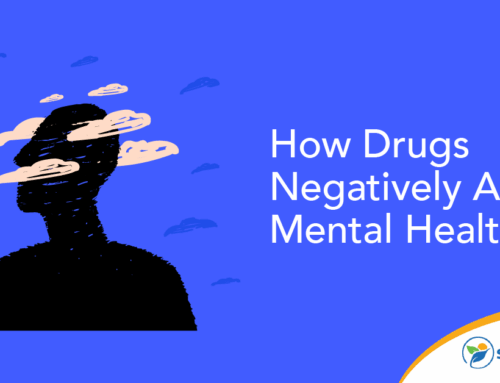The inability to breathe through a plugged-up nose is not only uncomfortable but interferes with sleep, diminishes your sense of taste and smell and worsens head pain. For some, being forced to breathe through the mouth due to congestion causes anxiety and even panic. Common nasal decongestant sprays with phenylephrine, such as 4-Way and Neo-Synephrine, provide 4-hour relief from congestion symptoms. These sprays quickly became a staple of medicine cabinets everywhere.
Soon after phenylephrine nasal sprays hit the pharmacy shelves, Afrin nasal spray entered the competition to offer 12-hour relief from congestion. But while Afrin immediately became a best seller, doctors realized that people were actually developing an Afrin addiction. Read on to learn more about nasal congestion, Afrin spray and its addictive qualities.
What Is Nasal Congestion?
Nasal congestion occurs when the immune system detects something harmful in the body, such as an infectious pathogen or allergen. Nasal tissue swelling is a type of inflammatory process meant to increase the production of mucus. Congestion and mucus generation continue until the immune system no longer detects invading microorganisms.
The most common causes of congestion are nonallergic and allergic rhinitis. Colds, flu and sinus infections are examples of nonallergic rhinitis. Allergies to pollen, mold, trees, pet dander, and other airborne particulates are examples of allergic rhinitis.
What Is Afrin Nasal Spray?
Afrin decongestant spray introduced a new drug called oxymetazoline that gave stuffy noses 12 hours of relief from congestion instead of the 4 hours provided by previous brands. Anecdotal reports of Afrin users experiencing burning and stinging sensations in their nasal passages, frequent sneezing, increased nasal discharge and nervousness after they stopped using Afrin began emerging in the 1990s. Researchers called this condition rhinitis medicamentosa (RM), or rebound nasal congestion, and attributed it to overuse of nasal sprays containing oxymetazoline.
What Are the Side Effects of Afrin?
The most common side effects of using Afrin are:
- Dry nasal passages
- Burning, itching and stinging of nasal passages
- Sneezing due to irritated nasal tissues
- Runny — but not congested — nose
If you experience these side effects after using Afrin for 3 or 4 days, they normally will subside within 24 to 48 hours.
Less common side effects of Afrin use include:
- Headache
- Nervousness
- Difficulty sleeping
- Nausea
- Rebound congestion when Afrin is used daily for more than 3 or 4 days
Although extremely rare, the following side effects of Afrin use should be reported to your doctor immediately:
- Muscle tremors
- Arrhythmia/pounding heart
- Increased blood pressure
Is Afrin Addictive?
Using Afrin for more than 3 or 4 consecutive days increases the risk of RM for the same reason using meth or cocaine more than once or twice increases the risk for addiction — your body develops a physiological dependence on the drug. With the continual use of Afrin, the blood vessels in your nasal passages begin adapting to the vasoconstriction caused by oxymetazoline. Each time you spray Afrin in your nose, these blood vessels eventually shrink less than they did the last time you sprayed.
As Afrin wears off and congestion returns, vessels dilate more and more. Ultimately, you’ll need to use Afrin several times a day to constrict blood vessels and remain uncongested. People with a severe Afrin addiction often have to keep a bottle of Afrin on their bedside table because their sleep is interrupted by nasal congestion.
Although you can’t get high on Afrin, this type of physiological addiction means you must regularly spray your nasal passages with it to breathe through your nose. In some ways, a person addicted to Afrin behaves like a drug addict: knowing exactly which stores carry Afrin, keeping a stash in their home and making sure they always have a bottle on them wherever they go.
Nasal sprays containing phenylephrine can also cause nasal rebound congestion, but it takes longer for symptoms to develop. However, steroid nasal sprays prescribed for allergy symptoms, such as Nasonex or Flonase, don’t cause rhinitis medicamentosa.
Is Afrin Safe to Use?
When used only as directed, Afrin and other nasal sprays are perfectly safe to use. The risk of suffering from rebound congestion significantly increases if you use Afrin for more than 3 consecutive days.
Does Afrin Cause Nasal Polyps?
Benign nasal polyps commonly develop on chronically inflamed mucous membranes within the nose and passages. While there’s no direct evidence linking the use of Afrin with nasal polyps, it’s possible an Afrin addiction could promote nasal polyp growth. Histology results of nasal polyp tissues have found huge amounts of white blood cells called eosinophils that are associated with allergic reactions and inflammation. Symptoms of nasal polyps are similar to symptoms of rebound congestion and include:
- Nasal congestion
- Runny nose
- Loss of taste and/or smell
- Headaches
- Nosebleeds
- Snoring
How to Get Off of Afrin
The only way to wean yourself off an Afrin addiction is to start reducing your use of it. If you stop using it abruptly, the rebound congestion symptoms will likely be so bad that you’ll probably start reusing Afrin to get relief.
For example, if you normally need to use Afrin every 3 or 4 hours, try to wait 5 hours before using it again. Do this for a day or so, and then wait 6 hours before using Afrin.
Some people can tolerate the congestion and stinging/burning sensations of rebound symptoms better than others. If you find it difficult to extend the amount of time between Afrin use, make an appointment with your doctor. In addition to prescribing a steroid nasal spray to help you get off Afrin, your doctor may also recommend saline sprays to keep nasal passages moisturized and oral decongestants to ease rebound side effects.
What Is the Difference Between Chemical Dependency and Addictive Use?
An Afrin nasal spray addiction is not the same type of addiction as a drug or alcohol addiction. Referring to someone as having a chemical dependency indicates they’re physically and emotionally addicted to alcohol, heroin, methamphetamine, cocaine or another addictive substance. Although you could say a person who needs to get off Afrin is chemically dependent on oxymetazoline to help them to breathe through their nose, this dependency doesn’t require medical detoxification, counseling and medication management.
Individuals who start using Afrin do so because they have a stuffy nose, want to breathe more easily and need to get some sleep while they recover from an illness. Addicts often turn to drugs for relief from painful, unresolved emotional issues they don’t know how to cope with. In other words, the primary difference between an Afrin addiction and a drug addiction involves deep-seated psychological problems that demand professional treatment.
Call Sunlight Recovery today for more information about how to get off Afrin or learn about our addiction recovery services.







